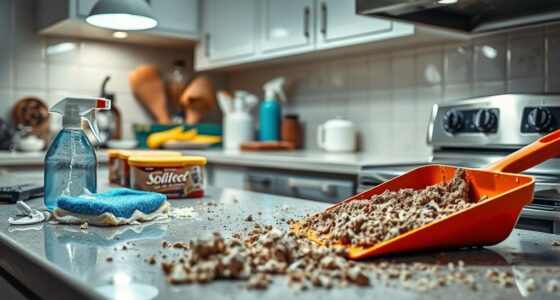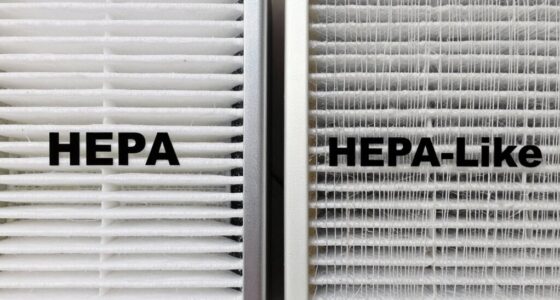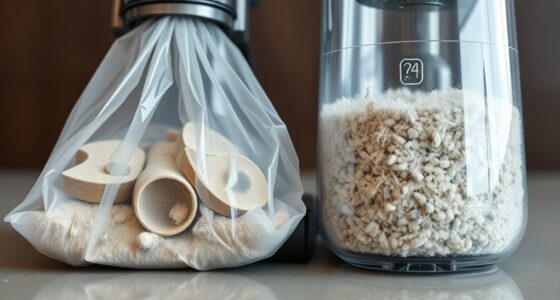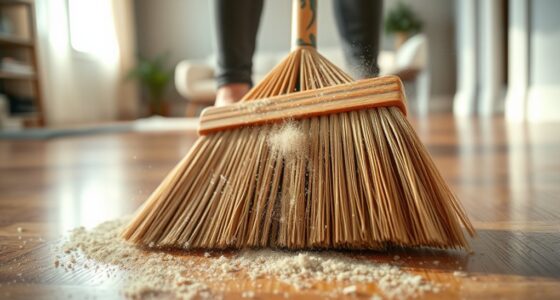Many common cleaning products contain harmful ingredients like phthalates, ammonia, and synthetic fragrances, which can pollute waterways and harm wildlife. These chemicals don’t break down easily and can pose health risks to you and the environment. To reduce pollution, avoid products with vague labels and ingredients you can’t recognize. If you want to uncover which ingredients are most damaging and how to choose greener options, keep exploring these insights.
Key Takeaways
- Avoid products containing phthalates, synthetic fragrances, and ammonia, which can persist in waterways and harm aquatic ecosystems.
- Steer clear of cleaning agents with non-biodegradable chemicals that do not break down easily after disposal.
- Check labels for harmful preservatives like parabens and formaldehyde-releasing compounds linked to pollution and health risks.
- Stay away from products with synthetic dyes and surfactants that can contaminate water sources and disrupt aquatic life.
- Opt for natural, plant-based ingredients such as vinegar, baking soda, and lemon, which decompose safely and reduce environmental impact.
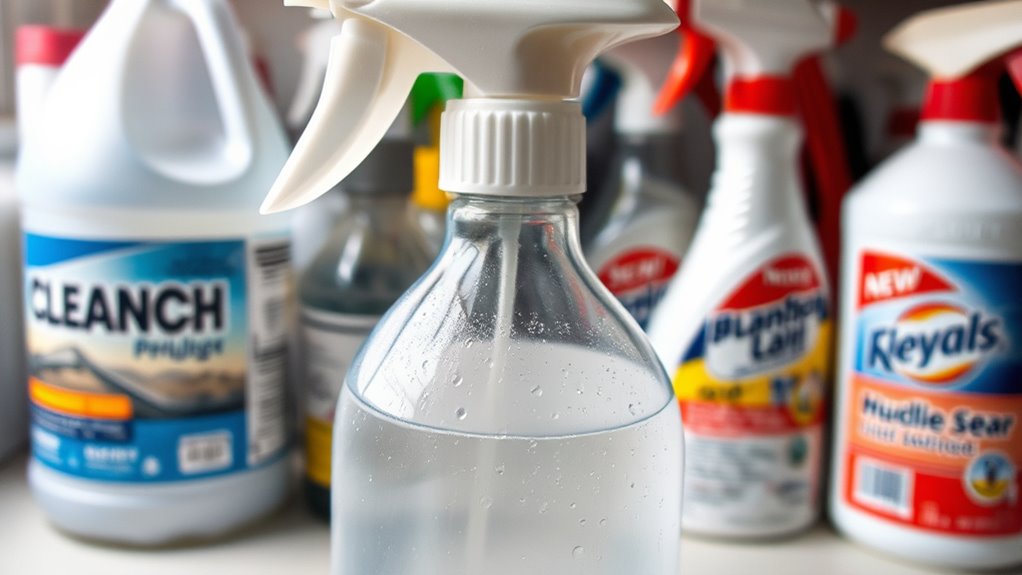
Many cleaning products you use daily can harm the environment without you realizing it. The ingredients in these products often contain chemicals that don’t break down easily, polluting waterways and harming wildlife. Fortunately, there are biodegradable options and natural cleaning agents available that are safer for the planet. Switching to these alternatives can make a significant difference, helping you reduce your ecological footprint without sacrificing cleanliness.
Biodegradable options are designed to decompose quickly and naturally after they’ve been used, meaning they don’t linger in the environment and cause long-term pollution. When shopping for cleaning supplies, look for products labeled as biodegradable or eco-friendly. These products typically use ingredients that break down faster and pose less risk to aquatic life. By choosing biodegradable options, you’re actively supporting a healthier planet and minimizing the amount of persistent chemicals entering our ecosystems.
Natural cleaning agents are another smart choice. They’re derived from plant-based ingredients and contain fewer synthetic chemicals. Common natural cleaners include vinegar, baking soda, lemon juice, and castile soap. These ingredients are not only effective but also safe to use around children and pets. For example, vinegar serves as a powerful disinfectant and deodorizer, while baking soda can tackle stubborn stains and absorb odors. Lemon juice adds a fresh scent and acts as a natural bleach. Using natural cleaning agents means you’re avoiding harsh chemicals like phthalates, ammonia, and synthetic fragrances that can cause pollution and health issues.
Many commercial cleaning products hide harmful chemicals behind vague labels, making it difficult to know what’s really inside. By opting for natural cleaning agents, you eliminate exposure to substances that can harm aquatic environments when washed down the drain. Additionally, choosing products with biodegradable ingredients ensures they won’t persist in the environment long after use. This shift not only benefits the planet but also encourages manufacturers to develop safer, greener formulations.
You don’t have to compromise on cleaning power to make eco-friendly choices. Many natural cleaning agents are just as effective as conventional options, especially when used correctly. For tougher grime, you can combine vinegar and baking soda or use specialty eco-friendly products designed for specific tasks. The key is being aware of what’s in your cleaning products and making conscious choices. By prioritizing biodegradable options and natural cleaning agents, you can keep your home spotless while safeguarding the environment for future generations. Additionally, understanding the importance of biodegradable materials can help you make more informed decisions when selecting cleaning products.
Frequently Asked Questions
Are There Eco-Friendly Alternatives to Traditional Cleaning Products?
You’re wondering if eco-friendly alternatives to traditional cleaning products exist. Yes, you can choose plant-based ingredients and biodegradable cleaners that are safe for the environment. These products effectively clean without harmful chemicals, helping you reduce pollution and protect ecosystems. Switching to such options not only benefits the planet but also creates a healthier home. Look for brands that emphasize natural, biodegradable ingredients to make a positive impact with your cleaning routine.
How Can I Identify Harmful Ingredients on Product Labels?
You can identify harmful ingredients on product labels by carefully reading ingredient labels, looking for unfamiliar or chemical-sounding names. Avoid products with harmful chemicals like phthalates, parabens, and artificial fragrances. Trust brands that clearly list natural or eco-friendly ingredients. If you’re unsure, research specific chemicals online to understand their effects. This way, you make informed choices and reduce exposure to potentially harmful chemicals in your cleaning routine.
Do Natural Cleaning Products Also Contain Potentially Harmful Ingredients?
Natural cleaning products often seem safer, but they can still contain chemical contaminants or artificial fragrances that may cause allergies or irritation. You should read labels carefully, even if the ingredients claim to be natural. Look for products with transparent ingredient lists and avoid those with synthetic dyes or preservatives. While natural ingredients tend to be less harmful, being vigilant helps you choose truly safer options for your home.
What Are the Long-Term Health Effects of Exposure to Polluted Cleaning Products?
Think of chemical exposure risks as silent rain, steadily soaking into your health over time. Long-term health effects from polluted cleaning products may include respiratory issues, skin irritation, or even more serious conditions like hormone disruption. Continuous exposure can chip away at your well-being, so understanding these risks helps you safeguard yourself. Being mindful of ingredients ensures you’re not unknowingly inviting trouble into your daily routine.
How Do Cleaning Product Ingredients Impact Indoor Air Quality?
You might not realize it, but cleaning product ingredients considerably impact indoor air quality. Volatile compounds released from these products can linger in the air, leading to respiratory irritation and other health issues. When you use cleaners with harsh chemicals, you expose yourself to these pollutants, which can worsen asthma or cause headaches. Choosing natural or low-volatile options helps improve air quality and reduces your risk of respiratory discomfort.
Conclusion
You might not realize it, but many common cleaning products contain ingredients that harm our environment. Did you know that over 50% of household cleaners release chemicals that can pollute our waterways? By choosing eco-friendly alternatives and reading labels carefully, you can diminish your impact. Every small step counts—your efforts protect wildlife, keep your home safe, and contribute to a healthier planet. Making smarter choices today helps ensure a cleaner, greener future for everyone.


